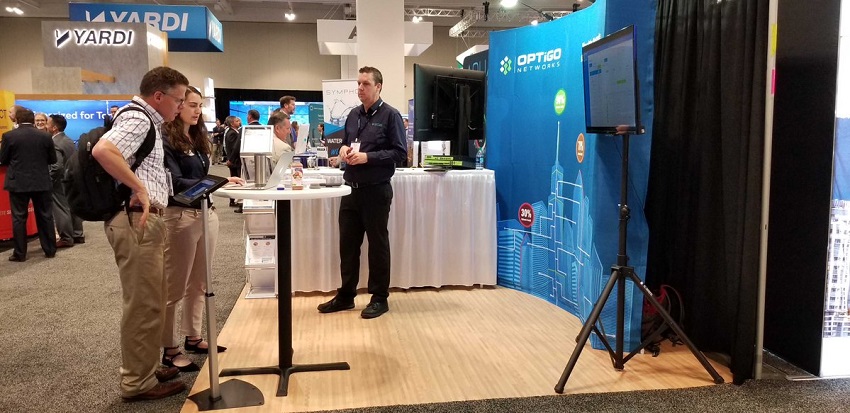
 INTERVIEW
– Pook-Ping Yao
and Monica
McMahen
INTERVIEW
– Pook-Ping Yao
and Monica
McMahen
|
July 2019 |
[an error occurred while processing this directive] |
| |

 INTERVIEW
– Pook-Ping Yao
and Monica
McMahen
INTERVIEW
– Pook-Ping Yao
and Monica
McMahen
Pook-Ping Yao, CEO, Optigo Networks
Monica McMahen, Director of Marketing, Optigo Networks
| Articles |
| Interviews |
| Releases |
| New Products |
| Reviews |
| [an error occurred while processing this directive] |
| Editorial |
| Events |
| Sponsors |
| Site Search |
| Newsletters |
| [an error occurred while processing this directive] |
| Archives |
| Past Issues |
| Home |
| Editors |
| eDucation |
| [an error occurred while processing this directive] |
| Training |
| Links |
| Software |
| Subscribe |
| [an error occurred while processing this directive] |
After eight years
attending Realcomm,
Optigo Networks has seen a real
evolution in the conference. From conversations to conference
attendees, Optigo CEO Pook-Ping Yao shares the most notable differences
that he’s seen at Realcomm 2019.
Monica
McMahen: How
have you seen Realcomm change over the 8 years you've been attending?
Pook-Ping Yao:
Well, first off, it’s ballooned in size. Realcomm
had fewer than 1,000 attendees when I first started attending; this
year there were about 2,500. I’m not sure how many vendors there were,
but it must have quadrupled. And the number of CIOs and CTOs from
property owners and developers has grown significantly. We’ve also seen
more non-traditional building people entering the world of Realcomm:
people who were pure IT are coming to give talks on cybersecurity and
educate the OT community, and it’s great to see that cross-community
engagement. Before, there were no venture capitalists who really paid
attention to Realcomm, but more VCs have started coming. That supports
innovation across the board, in buildings and in the companies and
startups developing new technology.
Something I’m happy to see hasn’t changed is the sense of community.
Even though the conference has grown, there’s the same camaraderie that
I’ve always seen at Realcomm. I look forward to this conference every
year, seeing good friends I met in year one. Now we’re just welcoming
more people into the fold.

Monica McMahen: What has it been like being part of that evolution?
Pook-Ping Yao:
Speaking frankly, I’m proud of it. We came in as a young company,
pushing the importance of an OT network. We’ve been in a position of
educating the industry for a long time, and this year it felt like
everything clicked. People didn’t just agree on the necessity of an OT
network; they were talking about best practices, how to implement it,
ways to build cutting-edge systems that delight their tenants. It’s
been amazing to help establish this new attitude towards operational
technology, and it’s always exciting to see the new innovations coming
out of the building industry. I still look forward to Realcomm every
year.
Monica McMahen: This
year we were involved in the Realcomm pre-conference Higher Ed
Summit. What conversations were happening there, that were different
from Realcomm/IBcon?
Pook-Ping Yao:
The conversations around colleges and universities are so
different and specific. They have research labs with unique needs like
temperature and humidity requirements, where a fraction of a degree of
change could ruin valuable research.
A lot of people don’t realize how operationally self-sufficient
post-secondary institutions are, as well. Colleges are a complete
ecosystem, often with their own energy production, powerplant, and grid
control. Cities have to worry about waste, but most cities don’t
produce their own energy; many colleges do.
Most colleges have a more aggressive greenhouse gas plan, carbon
neutrality plans, and many have done away with their coal plants and
are now running on natural gas or moving to renewable energy. How many
cities do that?
[an error occurred while processing this directive]Monica McMahen: What were
some key takeaways for you at Realcomm this year?
Pook-Ping Yao:
I noticed a few big things at the conference this year. First,
small innovative companies are creating highly specific, niche
offerings. That was very interesting to see, especially since a lot of
big, multinational companies weren’t at Realcomm this year. Will we see
more consolidation and partnering with these smaller, forward-thinking
companies?
I also saw the importance of looking outside the US for innovation in
the smart building industry. That was especially noticeable in the
session around innovation in China, which unfortunately a lot of people
missed.
I felt like the conversations around innovation at Realcomm had really
matured over the years. There was less “fluff” and more in-depth,
technical debate about how to implement all these great ideas. I really
saw that in understanding of the Internet of Things and cybersecurity.
Cybersecurity in particular became a conversation six or seven years
ago, and people really get the significance of it now.
Monica McMahen: What
should people be talking about more at Realcomm?
Pook-Ping Yao:
I’d like to see more conversations about getting women and young
people in the building industry. How can we engage a greater diversity
of people and perspectives? That is a discussion in the industry, but
we need to find a way to move the conversation along to real
suggestions and possible solutions. I think the first step would be to
highlight women and young up-and-comers in the industry at conferences
like this.
Thank you to
Realcomm for another wonderful conference! As always, we look forward
to the next Realcomm/IBcon.
[an error occurred while processing this directive]
[Click Banner To Learn More]
[Home Page] [The Automator] [About] [Subscribe ] [Contact Us]